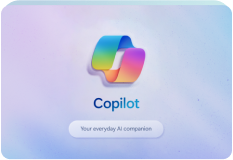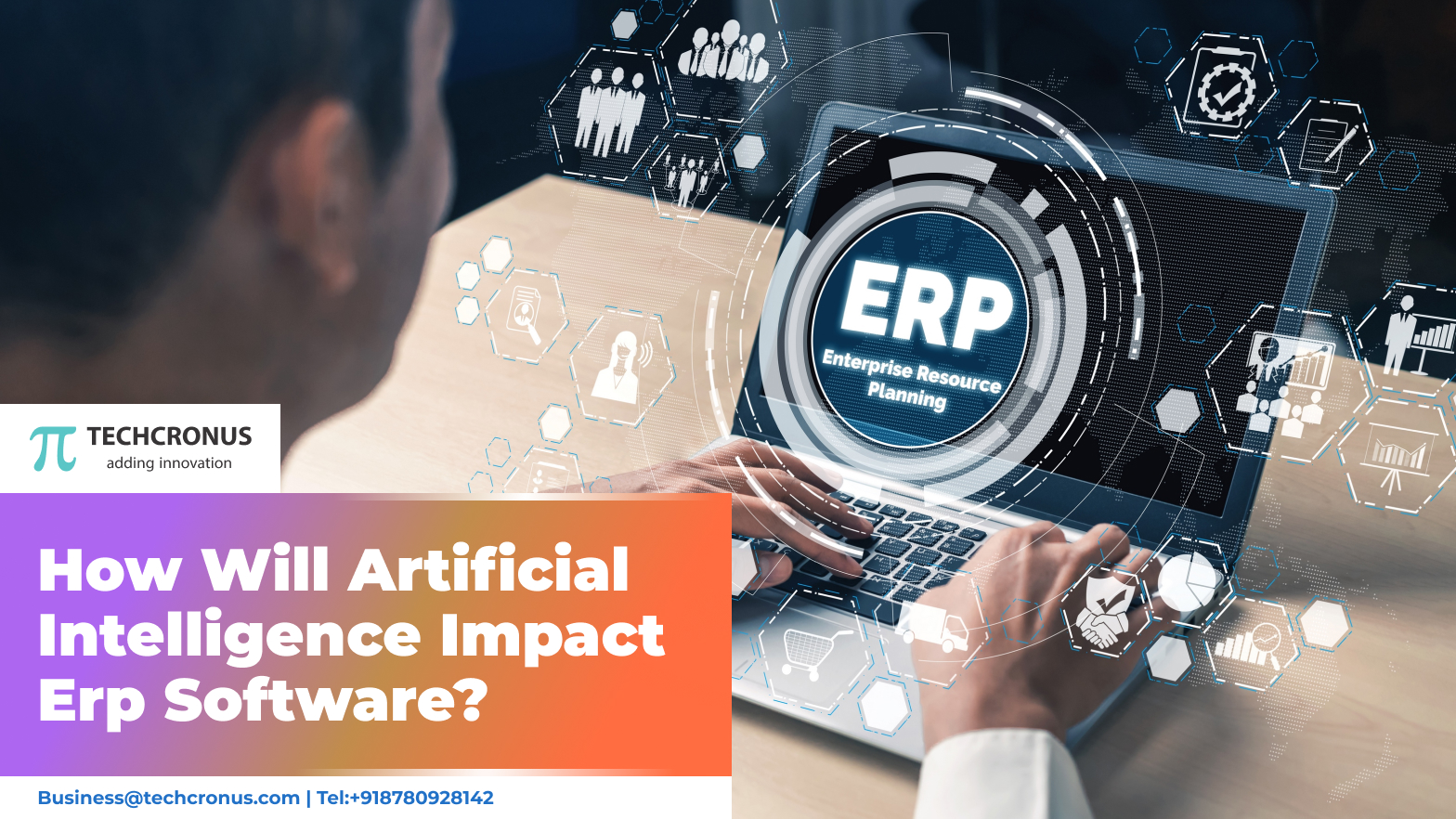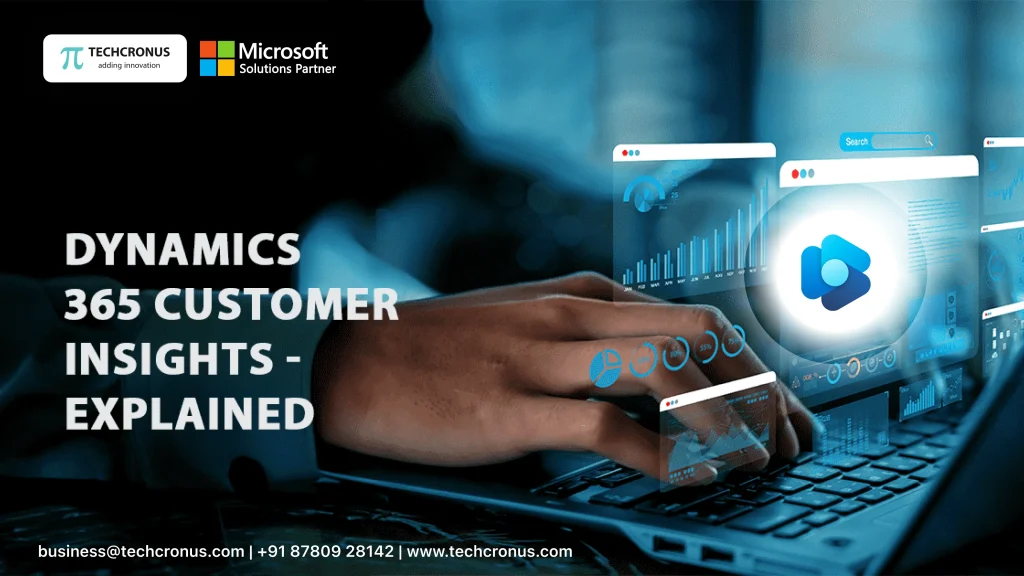Table of Contents
Artificial Intelligence (AI) technology is poised to reshape our daily lives and professional landscapes. A noteworthy instance of this transformation is evident in the dynamic evolution of business management software solutions like ERP Systems for Small Businesses, which are undergoing redesigns with AI at their core. The central query now centers on the profound impact of Artificial Intelligence on ERP Software such as predictive analytics, automation, and real-time insights for SMEs.
This article delves into key domains where AI is expected to exert its influence on the ERP Software industry. Notably, global leaders in AI-driven ERP solutions, including Microsoft, are actively investing in innovation. Their emphasis is on delivering revolutionary AI-driven capabilities within ERP systems, marking a pivotal shift in how businesses operate.
Exploring critical areas of impact, this discussion underscores the ongoing commitment of industry giants like Microsoft. Their substantial investments in innovation are directed towards ushering in game-changing AI-driven features within ERP systems, promising to revolutionize conventional business practices.
Artificial Intelligence (AI) stands at the forefront of the emerging digital transformation era, catalyzing a paradigm shift in how organizations navigate their end-to-end business functions. The integration of AI-driven automation is poised to introduce a transformative layer of substantial value, empowering organizations to achieve heightened levels of productivity and performance. This evolution aims to streamline operations, curtail costs, and establish a sustained competitive advantage in the ever-changing business landscape.
How Artificial Intelligence Will Impact ERP Software:
The influence of Artificial Intelligence (AI) on ERP systems is a pivotal aspect in shaping the future of business operations. The impact of AI on the ERP software industry will play a crucial role in defining the business landscape in the coming years. Many organizations view the integration of AI-driven ERP technology as essential to their overall business strategy and objectives. The success of AI technologies like Microsoft’s Copilot and OpenAI Chat GPT highlights the increasing democratization of AI opportunities for a wide range of users.
ERP solutions form an integral part of how organizations orchestrate their end-to-end business operations. The evolving capabilities of AI in ERP present substantial opportunities for businesses. As seen with the advancing AI in ERP, there are significant prospects for reshaping how businesses leverage ERP technology in the future. The role of AI in ERP is poised to be a transformative force, marking a paradigm shift in the dynamics of business management.
What is Enterprise Resource Planning?
Enterprise Resource Planning (ERP) is a category of software systems designed to facilitate the automation and optimization of various business operations across an organization. These comprehensive ERP software solutions are instrumental in streamlining end-to-end processes encompassing finance, operations, sales and marketing, service, human resources, supply chain, manufacturing, distribution, logistics, and more. The contemporary evolution of ERP systems is notably influenced by the integration of Artificial Intelligence (AI) technologies, marking a profound shift in the dynamics of the ERP Software Industry. The infusion of AI-powered capabilities into ERP technology plays a pivotal role in shaping the modern landscape of business management.
What is Artificial Intelligence?
Artificial Intelligence (AI) is a term used to describe the application of intelligent technology to perform tasks that were traditionally carried out by humans or required human intelligence input. In simple terms, AI represents the capability of machines to simulate human-like cognitive functions. Within the realm of ERP, AI is poised to define the next generation of ERP Software Systems. An example of AI in action is Generative AI, a technology capable of creating images and text through generative models. The process involves AI models learning from existing datasets to discern structures, trends, and patterns, subsequently generating new data with similar features.
Presently, AI permeates various aspects of daily life, from smartphones and devices to smart homes, contributing to a new era of enhanced productivity. The innovation in AI technology serves as the cornerstone of how we efficiently manage resources, promote sustainability, and drive smart economies. This pervasive influence is shaping the digital footprint of the future, marking a transformative era driven by AI advancements.
How Organizations are embracing AI to manage end-to-end business operations:
An increasing number of organizations are recognizing the substantial potential of integrating AI into ERP Software systems, presenting an opportunity to achieve unprecedented levels of productivity and associated gains. Leading ERP Systems are now incorporating AI by leveraging advanced technologies such as predictive analytics, virtual assistants, bots, machine learning algorithms, generative AI, OpenAI, Copilot capabilities, and more. This integration of ERP and AI empowers organizations to extract meaningful actionable insights from the vast volumes of data generated across their systems. This, in turn, facilitates the automation and streamlining of complex business processes, enabling scalability to new heights of productivity and efficiency, and fostering enhanced planning and forecasting through AI-infused data-driven decision-making.
The evolution of ERP Cloud Solutions is creating opportunities for a broader spectrum of organizations to harness AI capabilities and features, meeting the escalating demands of customers and industries alike. Numerous industries are now experiencing the benefits of AI-infused ERP technology. For instance, in the Service industry, AI is transforming customer support and service management by optimizing agent productivity. Utilizing AI technology, service providers deliver superior quality and intelligence-led service through AI-powered agent assist tools and virtual assistants.
This AI transformation of customer experiences empowers agents to provide faster and more intelligent support, incorporating automation and AI into issue resolution. In the manufacturing industry, AI capabilities are leveraged for enhanced quality control, intelligence-based production scheduling, order management, real-time monitoring, predictive maintenance, and other critical functions. This illustrates how AI is becoming an integral part of diverse industries, revolutionizing their operational landscape.
What is the Influence of AI on Data Handling & Business Intelligence?
At the core of every organization lies its data and information, representing a critical asset for deriving optimal business intelligence results and insights. AI is spearheading a revolution in the entire process of data handling and business intelligence, emerging as a transformative force in the broader BI & Analysis landscape. Integrating AI tools into data management empowers organizations to extract the most value-driven insights from their data with enhanced efficiency, facilitating informed and trusted data-driven decision-making. This infusion of AI into the realm of data and business intelligence signifies a game-changing paradigm shift, elevating the capabilities and outcomes within the BI domain.
What is AI’s Impact on Process Automation?
Traditionally, organizations relied on conventional ERP tools to streamline and automate their business processes. However, in the contemporary era of AI-infused ERP Software systems, there is a noticeable shift towards the integration of AI alongside no-code/low-code tools, reshaping the landscape of process automation.
The significance of AI in process automation lies in its capacity to introduce advanced tools and algorithms. These technologies enable organizations to dissect layers of data sources, constructing robust knowledge base software that offer novel approaches to achieving greater efficiencies and productivity throughout business processes and workflows This transformative integration can yield substantial AI-driven improvements, including the automation of repetitive tasks. This, in turn, liberates personnel to concentrate on more pivotal areas, enhancing resource and time allocation, ultimately resulting in significant cost savings. The infusion of AI into process automation is redefining traditional practices and paving the way for more adaptive and efficient business operations.
How does AI Improve User Experience in ERP systems?
A significant challenge often encountered in ERP projects revolves around the User Experience. If the design is overly restrictive and lacks user-friendliness, it creates an environment with a less-than-friendly user experience, potentially adversely affecting the entire organization and diminishing ERP user buy-in. Users may encounter difficulties in navigating the ERP solution, struggle with basic tasks, or face challenges in locating the right data and information promptly.
AI-infused ERP has brought about a profound transformation in the user experience, making everyday processes and tasks more navigable and automating them, consequently freeing up valuable time and resources. An exemplary illustration of how AI enhances user experience is particularly evident in the Services sector. Users now have access to virtual agents, remote assistants, and bots that guide them through the entire service and support issue resolution cycle, demonstrating how AI contributes to a more streamlined and user-friendly ERP environment.
Who are the ERP AI Software Market Leaders?
Several prominent ERP vendors are making substantial strides in the ERP AI space, with noteworthy players including Microsoft, SAP, Oracle, and others. These leading ERP software vendors have strategically placed AI at the core of their approach, aiming to deliver the next generation of intelligent ERP software solutions. Their influence extends across the entire landscape, shaping the scenarios of how Artificial Intelligence will impact ERP software.
Some Features and Benefits of AI-Enabled ERP
Traditional ERP systems, while valuable for business functions, lacked the adaptability and intelligence needed for today’s dynamic landscape. Enter AI-powered intelligent ERP, ready to revolutionize how companies leverage technology to achieve strategic goals. This unlocks new levels of performance and growth, driving profitable outcomes.
Recognizing the immense potential of AI-infused ERP, businesses are rapidly embracing “intelligence-led automation” across their entire operations. In response, ERP software providers are aggressively integrating advanced AI features and capabilities, transforming the very nature of Enterprise Resource Planning.
Here’s where the game-changing difference lies: not just the features offered by ERP vendors, but how businesses implement and integrate AI-infused ERP software. This strategic integration becomes the key differentiator in the age of “intelligence-led” business strategies.
Features & Benefits of AI-Infused ERP Software Solutions:
Automation of End-to-End Business Processes: AI technology allows for the automation of intricate and repetitive tasks, freeing up resources to focus on more important priorities.
Achieving New Levels of Productivity and Efficiency: AI-driven automation allows departmental teams to increase their productivity, efficiency, and cooperation.
Access to Meaningful Business Insights: AI-infused ERP data and analytics bring substantial value by providing deep insights that truly matter to the business.
Real-time Reporting & Analysis: Improved AI-infused reporting and analysis contribute to more accurate, timely, and reliable data, fostering informed, intelligence-led, data-driven decision-making.
Enhanced Forecasting & Planning: Utilizing AI-led algorithms for forecasting and planning, identifying patterns, predicting trends, and reducing human error. This leads to more accurate, timely, and trustworthy forecasting and planning.
Augmented Customer Engagement: Leveraging AI for more effective end-to-end customer engagement strategies, resulting in a higher return on technology investment, increased customer loyalty, and improved retention.
Optimized Manufacturing Processes: AI capabilities in manufacturing enhance quality control, intelligence-based production scheduling, order management, real-time monitoring, predictive maintenance, and more.
Informed Data-Led Decision-Making: AI facilitates intelligence-led, data-driven decision-making by uncovering and providing access to real business insights often concealed within vast amounts of ERP data and information.
Highlighting a leading ERP AI software vendor – Microsoft
In the realm of transformative ERP technology, Artificial Intelligence (AI) has become a pivotal element, reshaping how businesses operate. Many leading ERP software providers have made AI integration a top priority to improve “intelligence-led end-to-end business operations,” promoting a smart-working approach that greatly increases productivity and efficiency. Microsoft emerges as a global leader in incorporating AI into its ERP solutions, notably through the Microsoft Dynamics 365 Platform.
Built on the Microsoft Power Platform, Dynamics 365 empowers organizations with a suite of tools for automating tasks, analyzing data, creating apps, and developing virtual agents/chatbots. The Dynamics 365 Platform includes various business software applications, covering ERP and CRM Customer Engagement applications for Finance and Operations, Sales, Marketing, Customer Service, Project Operations, and PowerApps.
Copilot AI for Microsoft ERP Software Solutions:
AI for Sales: Utilizing AI to offer actionable insights for sales teams, prioritizing leads and opportunities with the highest likelihood of conversion.
AI for Customer Insights Data: An AI-powered feature aggregating data from various sources to create a 360-degree view of customers, facilitating personalized engagement.
Customer lifecycle value: Predicting potential revenue throughout a customer’s interaction lifecycle with a business.
Product recommendation: Suggesting predictive product recommendations based on purchase behavior and similar customer patterns.
Subscription Status analysis: Predicting potential customer churn for subscription products.
Transactional Status analysis: Forecasting if a customer will cease purchases within a certain timeframe.
Customer Sentiment analysis: Analyzing sentiment from customer feedback and identifying frequently mentioned business aspects.
AI for Customer Insights Journeys: Empowering business users to build trigger-based journeys with AI and natural language input assistance, enhancing customer relationships across multiple touchpoints. This includes real-time engagement, winning and retaining customers faster, personalizing experiences with AI, and growing with a unified, adaptable platform.
AI for Customer Service: Providing actionable insights into performance metrics, operational data, and emerging trends from Dynamics 365 Customer Service.
Cash Flow Forecasts in D365 Business Central ERP: Leveraging Azure AI in Dynamics 365 Business Central for efficient cash flow forecasts, incorporating documents with future due dates.
Sales and Inventory Forecasts in D365 Business Central ERP: Predicting potential sales using historical data and offering an overview of expected stockouts.
Late Payment Predictions in D365 Business Central ERP: Predicting late payments for sales documents, assisting in reducing outstanding receivables, and refining collections strategy.
Supply Chain Smoother: AI in Dynamics 365 turbocharges your supply chain. Predict disruptions, manage inventory like a boss, and fulfill orders with genius. Efficiency on autopilot!
Fraud Fighters: Say goodbye to financial worries! AI guards your transactions 24/7, stopping fraudsters in their tracks and keeping your customers’ data safe and sound.
Virtual Sidekicks: Meet your AI assistants, always ready to help! They chat with customers and employees, answering questions and solving problems instantly. Boost satisfaction and productivity, and watch smiles grow.
What is Dynamics 365 Business Central ERP?
Microsoft Dynamics 365 Business Central is a cloud-based, all-in-one business management solution specifically designed for small and medium-sized businesses (SMBs). It combines the functionalities of traditional ERP systems, like finance, operations, sales, and customer service, into a single, integrated platform.
Here are some key features of Dynamics 365 Business Central ERP Software:
Financial Management: Streamline accounting, manage budgets, track expenses and inventory, and gain real-time financial insights.
Operations Management: Optimize inventory levels, manage purchase orders and production processes, and improve supply chain efficiency.
Sales Management: Manage the entire sales cycle from lead generation to order fulfillment, track customer interactions, and generate sales reports.
Customer Service Management: Provide efficient customer support, manage service agreements, track service tickets, and improve customer satisfaction.
AI-powered Insights: Gain valuable insights from your data using built-in AI features like forecasting, anomaly detection, and recommendations.
Scalability and Flexibility: Easily adapt the system to your specific needs and grow with your business.
Cloud-based Deployment: Access your data and applications from anywhere, anytime, on any device.
Benefits of using Dynamics 365 Business Central ERP Software:
Increased efficiency and productivity: Automate tasks, streamline processes, and improve data accuracy.
Improved decision-making: Gain real-time insights and make data-driven decisions.
Enhanced customer relationships: Improve customer service and satisfaction.
Increased profitability: Reduce costs, grow revenue, and improve overall business performance.
What next for AI-powered ERP Software Solutions?
The Future of AI-Powered ERP Systems:
Many more partners in this field are yet to fully enter this market space. The connection between AI and ERP is expected to strengthen, redefining the ERP industry. AI-powered ERP software is anticipated to become a fiercely competitive space, with vendors vying for market share and dominance. This is likely to give rise to trends in how Artificial Intelligence will impact ERP software, including:
Expanding Human and AI Intelligence: Opening up AI ERP solutions to a wider audience, leading to a growing demand for industry-specific focused AI ERP solutions.
Powerful and Flexible AI Integration: Witnessing powerful and flexible AI integration across ERP platforms and solutions, enhancing their capabilities.
AI ERP Regulatory Control: Increased emphasis on regulatory control for AI ERP, placing more obligations on vendors, users, and customers to be accountable and transparent in their engagement and interaction with AI.
Mergers and Acquisitions: Larger market participants are expected to merge and acquire additional AI tools to take advantage of prospective prospects.
Continued Research, Development, and Innovation: Evolving AI-infused ERP software systems are expected to drive ongoing research, development, and innovation in this space.
Conclusion:
In its early stages, the integration of AI with ERP software shows promise for transformation. These reasons highlight the ways AI will impact this essential business tool, showcasing its potential and undeniable benefits.
AI-powered ERP systems are set to revolutionize operations, automating tasks and providing AI-driven insights to empower organizations with adaptability and agility. They allow businesses to scale and adjust to the evolving landscape of AI-driven processes and automation needs.
AI-driven ERP software is the catalyst for the upcoming wave of digital transformation, leading to “AI-intelligent business models” and improved user experiences that unlock productivity and create new opportunities in the dynamic world of AI-driven business. Exciting chapters lie ahead in this captivating story of AI and ERP. Stay tuned for updates!






















